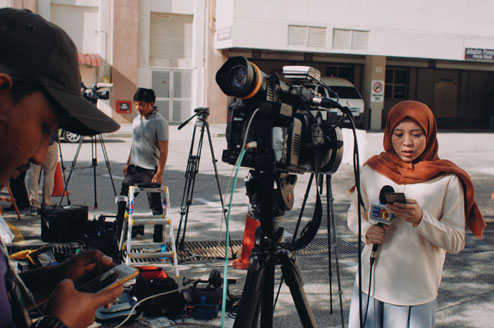Crossings

A FEW months ago, a clip of a young Malaysian woman putting shampoo on her hijab went viral on social media. The video, believed to be an advert for a Malaysian brand of shampoo, invited wrath of people worldwide. Social media enthusiasts labelled Malaysia a regressive Muslim country which doesn't give freedom to its women to take off their hijabs even while washing their hair.
But what transpired later was that it wasn't a shampoo ad but a parody ad made by a local headscarf company. Their intended message: these headscarves are as comfy as one's hair would feel after shampooing.
Since my sister lives in Malaysia, the controversy triggered my interest in the lives of Malaysian hijabi women. When I landed in Kuala Lumpur for a holiday with her and her adorable black labrador, Buzo, I was curious to know about hijabi women there. I spotted them everywhere - driving buses and taxis. I saw them selling train tickets at KL Sentral station. I saw them helping travellers at information desks of airports. I saw them selling lingerie in malls. I saw them working late at restaurants.

Hijabi women were part of my high-intensity interval training class, too. They walked in wearing the hijab but changed to fitted sportswear to work out in the all-women class. After the two-hour session, the hijab was back to where it belonged.
One evening, at Kasturi Walk, a flea market near Kuala Lumpur's Chinatown, I came across a bunch of slim and petite hijabi women, barely in their teens. They looked seduced by the sleeveless tops and trendy cotton, printed shorts. As I saw the girls buying a pair each, I felt compelled to talk to them. I wanted to ask - Do their family members know about their preference of clothes? What has been their journey so far in hijabs? Do they face any diktats from the men in the community? I cursed myself for not knowing Malay, the local language.
But my quest to know more about the hijabi women was somewhat fulfilled during a casual conversation with a Chinese Grab (App-based taxi service) driver. He told me that he has a Muslim girlfriend who works in a bank. She wears a hijab but she has no restrictions whatsoever. "Women enjoy every freedom in Malaysia," he asserted.

But, I asked him, is Malaysia untouched by Islamist radicals? Isn't it becoming a hub for ISIS recruitment in Asia? I told him about this US-based Pew Research Centre's Global Attitudes survey 2015, which showed 11 per cent people in Malaysia held favourable views of ISIS.
He slowly opened up. His peace-loving, multicultural nation has seen some attempts by radicals to make it a more intolerant and radical Muslim country, he said. "There is a section of Muslims who judge women if they are 'Muslim' enough."
In 2015, Malaysian gymnast Farah Ann Abdul Hadi was criticised for exposing "too much of her body" during the Singapore Games despite winning silver and bronze medals. But the then minister of sports defended her; he even criticised one of his colleagues for making a fuss over her attire.
Despite being as global as neighbouring Singapore, some recent incidents have forced the locals to think if Malaysia is losing its cosmopolitanism and if radicals have been taking centre stage. For example, on Valentine's Day this year, the National Muslim Youth Association advised Muslim women against using emoticons in text messages or wearing fragrance. Two years ago, some women took to Facebook to complain that they were being forced to wear a sarong to cover their legs at a government office and also at a hospital.
But I saw women from every part of the world moving freely in a pair of shorts or tunics on Kuala Lumpur's streets. And so was I. At least, for some days, I didn't have to counter stares from strangers - men and women - for wearing short dresses. As an Indian woman, I felt more liberated in this Muslim country.
Sonia Sarkar











